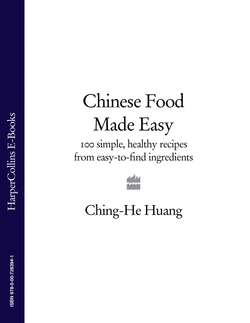Читать книгу Chinese Food Made Easy: 100 simple, healthy recipes from easy-to-find ingredients - Ching-He Huang - Страница 6
CHINA AND CHINESE CULTURE: MY ENDLESS SOURCES OF INSPIRATION
ОглавлениеSo far in my food career I have been fortunate to meet and swap tips with cooks, chefs, foodies and people from all walks of life who have a tremendous appetite for good food, and I hope long may these experiences and exchanges continue because I am enriched by them. I feel very lucky to have travelled in China recently and to have seen it go through a very exciting transformation. With China hosting the forthcoming Beijing Olympics, the world’s attention will be focused on all things Chinese for those few weeks, and for this I am grateful. I am pleased that it will allow China to show off its rich and beautiful culture, open its doors and share it with the world. There’s never been a better time to get excited about China, so whether it’s food, culture or language that you are interested in – go for it!
Food, to Chinese people, means many different things and it is the cultural heart and soul of China. Food is of such social and economic importance that the Chinese language and common phrases are founded almost solely to express this importance. When I studied Chinese at Sunday school (forced by my parents but now I am so glad I did), I learnt phrases that express how important food is. During the Chinese New Year, we would have a meal called ‘Tuan yuan fan’ (Togetherness rice/meal), which is used to express the idea of families getting together to eat on this special occasion. In Beijing, when you lose your job, they have a saying, ‘Da puo le fan guo’ (You’ve broken the rice bowl, or in other words, you’ve lost your wages in terms of food).
Whenever I eat with friends or family in China, the hospitality never ceases to amaze me. It is the ‘E-e’ (meaning) behind the gestures and the character and symbolism of the food that is significant. I really believe that to understand Chinese culture you must start by learning Chinese food culture. For example, when holding a banquet, the number of dishes ordered and the quality and cost of the ingredients should be taken into consideration – be sure not to under-order or you will seem money-pinching, and be sure not to over-order or you may be considered a show-off. The Chinese communicate through eating. A well ordered banquet meal can be considered real ‘kung fu’ – the skill in achieving the right balance and yet appearing humble and modest to your guests. (Never fear, if you ever find yourself in a banquet situation just remember to be yourself and that all acts of love are universally appreciated.)
As I was growing up, my mother, when preparing a meal, would always make reference to the fact that she had spent hours making a certain dish or how she had had to go to a special outlet to get an ingredient, and so on. I used to think we were such a burden to her. But now I understand she wasn’t trying to make us feel bad, rather that it was her way of communicating and expressing how much she loved us; she showed it through the time and difficulty it took to prepare the dishes – the labour of love!
This ‘love’ can be found throughout Chinese history in the kitchens of the imperial courts of the dynasties that ruled China over the centuries. The love for the emperor was shown by the number of dishes prepared for a meal – I was told that the late Empress Dowager Cixi (of the last Qing dynasty) would have on a daily basis over 108 dishes cooked for her in a one-meal sitting. And that in the emperor’s court there were more food and wine staff than any other staff (apart from the Emperor’s armies, of course). A lot of the inspiration behind imperial cuisine related to the preparation, time and skill required to cook a dish – fish eyes are a delicacy not because of their flavour but because of the amount of fish that has to be caught to make a dish full of them! When your Chinese friends take you out and lavish you with their hospitality, it’s their way of saying they love you!
I continue to learn about my heritage every day. My culinary passions are kept alive by the wealth of truths and traditions in my culture, which I am pleased to be able to share and introduce a little to you through my recipes.
